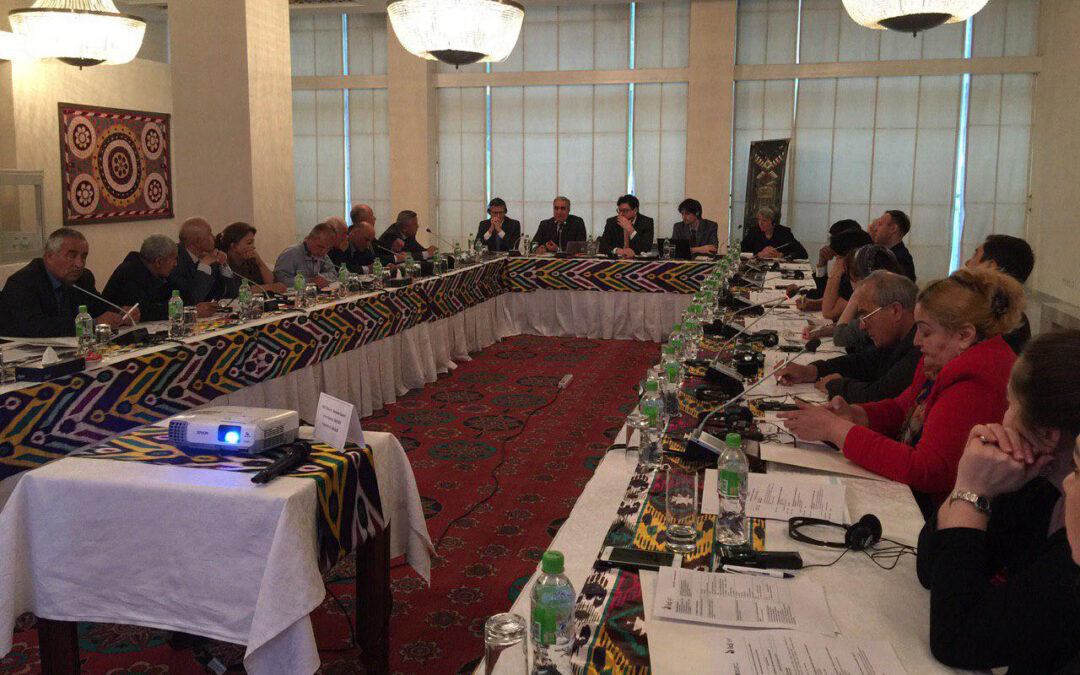
May 4, 2019 | News
The ICJ concluded a research mission on the independence of the judiciary in Tajikistan on 3 May. Following the mission, the ICJ expressed concerns about the independence of individual judges as well as the functioning of judicial institutions and procedures in law and in practice.
The mission included ICJ Commissioner Justice (ret.) Martine Comte of the Orleans Court of Appeal (France) and ICJ Secretary General Saman Zia-Zarifi.
The ICJ spoke with a wide cross-section of stakeholders, including senior government officials, numerous former judges, senior advocates and working lawyers, as well as journalists and members of civil society. The ICJ will provide its findings in a final mission report that will set out include key recommendations to help Tajikistan meet its international obligations.
Among other things, the ICJ mission discussed recent initiatives to reform the judiciary, including the Judicial Reform Programme of 2019-2021 which has been recently been adopted by the President of Tajikistan, and which provides an opportunity to strengthen judicial independence.
The ICJ mission gathered information about the newly formed Qualification Commission for qualification and disciplinary procedures for judges. This replaced the Council of Justice, which had been criticized by international observers for its lack of independence.
Although formally established under the Supreme Court, the Qualification Commission consists predominantly of members of the executive with only two out of seven members being representatives of the judiciary.
Multiple lawyers and former judges expressed serious concerns about the right to a fair trial in criminal proceedings, pointing in particular to the extremely low acquittal rate for suspects. It appears that numbers of acquittals have declined over several decades and that acquittals are now extremely rare.
The ICJ also received complaints that pubic access to court hearings is impeded in practice despite clear legal provision for the public nature of court proceedings, with limited exceptions. Members of the public were said to be generally unable to attend court hearings freely where they are not parties to the proceedings.
Furthermore, the ICJ heard that judicial decisions are generally not available to members of the public unless they are participants in the proceedings.
The ICJ wishes to express its gratitude to everyone who contributed to the successful conduct of the mission, including State, inter-State and non-State organisations and bodies which the ICJ met and communicated with.
The ICJ wishes to stress its appreciation of the support provided by the OSCE Office in Dushanbe and the United Nationals Human Rights Office.
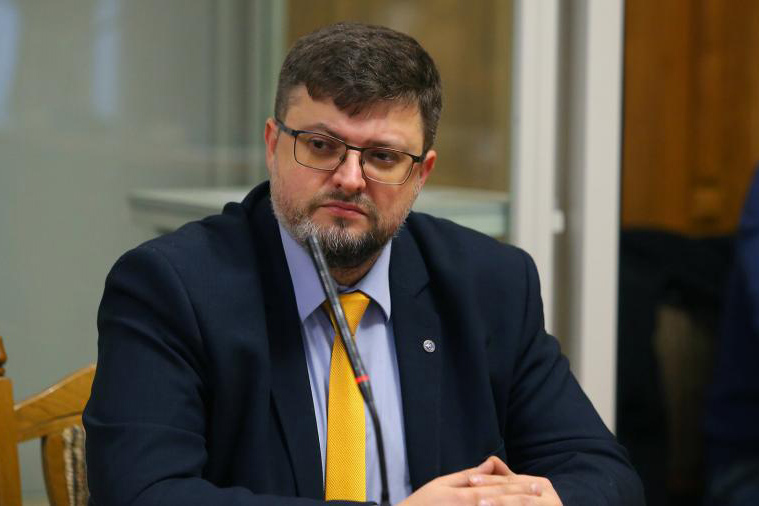
Apr 12, 2019 | News
Today, the ICJ expressed concern at the criminal proceedings against Andriy Domanskyi, a lawyer practicing in Ukraine, known for representing individuals facing political prosecution and defending journalists.
The ICJ has called on the Ukrainian authorities to drop any criminal proceedings which may result from the identification of the lawyer with his clients and to ensure that the lawyer’s rights are protected and that he can continue to carry out his professional activity without improper interference, intimidation or threat.
On 5 April Domanskyi was issued a note of suspicion in a criminal proceeding reportedly initiated in 2013 concerning the “privatization of municipal premises”.
Criminal proceedings were initiated one day after the commencement on 4 April of a trial of his client Kirill Vyshynskyi, Chief Editor of RIA Novosti Ukraine recently changed with high treason and a number of other crimes.
Domanskyi considers these criminal proceedings against him are linked with his professional activity and are a means of putting pressure on him as a result of work on this high-profile case.
Earlier this year, on 17 January, while Domanskyi represented Vyshynskyi in a court hearing on the lawfulness of his arrest in Kherson, the lawyer’s home, office premises and his assistant’s relatives’ premises in Kyiv were searched by the officers of the General Prosecutor’s Office.
This took place only a few days after the Security Service of Ukraine (SBU) publicly announced that the investigation regarding Vyshynskyi had been terminated.
While these searches were sanctioned by the court, another search was conducted on the same day and was sanctioned by an investigator rather than the Prosecutor General or his Deputy or the Prosecutor of Kyiv City, as provided by the Law of Ukraine “On advokatura and advocates’ activity”.
The lawyer connected these searches to the fact that at that time he repeatedly filed motions to release Vyshynskyi on bail, with himself acting as a guarantor on the bail.
Any criminal proceedings against the lawyer amounting to harassment or reprisals for his professional activities would be highly problematic.
In recent years, the ICJ has witnessed an alarming increase in the number of cases of interference with the work of lawyers, including use of legal proceedings, threats or physical attacks on lawyers in Ukraine.
As was confirmed during an ICJ mission carried out only last month, searches of lawyers’ premises are often performed without due respect to procedures prescribed by law and result in undermining the independent work of lawyers and respect of procedural rights guarantees under national and international law.
Principle 18 of the UN Basic Principles on the Role of Lawyers states that, “lawyers shall not be identified with their clients or their clients’ causes as a result of discharging their functions.”
As affirmed by the Basic Principles, governments must ensure that lawyers “are able to perform all of their professional functions without intimidation, hindrance, harassment or improper interference” and “shall not suffer, or be threatened with, prosecution or administrative, economic or other sanctions for any action taken in accordance with recognized professional duties, standards and ethics.”
“Investigative and other law enforcement authorities in Ukraine must stop harassment of lawyers, including by improperly associating them with their clients or their clients’ causes, and carrying out searches of lawyers’ offices and documents in violation of national law and procedure as well as international human rights standards,” said Temur Shakirov, ICJ Senior Legal Adviser.
“In this regard, the ICJ stresses that this troubling pattern of attacks affects not only individual lawyers but also the legal professional as a whole. The Ukrainian authorities should take prompt and effective measures to ensure that lawyers are not identified with their clients or their client’s causes and that the safety and independence of lawyers is guaranteed in law and in practice,” he added.
Additional information:
On 4-8 March, the ICJ carried out a research mission to Ukraine on the independence and security of lawyers. Following the mission, the ICJ called on the Ukrainian authorities to take urgent steps to ensure the physical safety of lawyers and to bring to justice those responsible for a series of violent attacks against them.
Ukraine-Domansky statement-Advocacy-2019-UKR (story in Ukrainian, PDF)
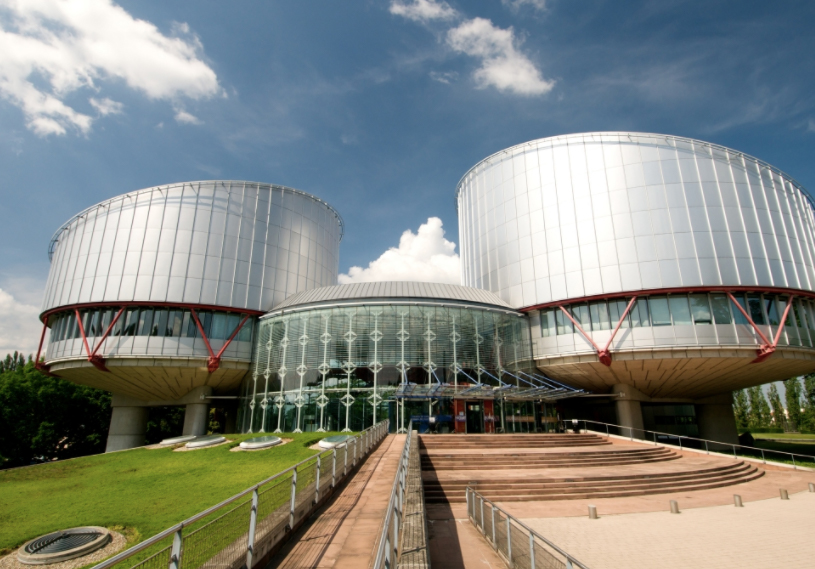
Apr 12, 2019 | News
Today in Ankara the ICJ convened a workshop for lawyers and civil society practitioners on the implementation of judgments of the European Court of Human rights.
The 29 participants in the workshop will examine methods and tools available to guarantee the effective execution of the European Court of Human Rights judgments in Turkey.
The participants in the workshop will discuss the use of the Committee of Ministers’ judgment execution process and the potential of “rule 9“submissions, as well as ways to advance the implementation of the judgments oft he European Court of Human Rights in Turkey.
The workshop will share good practices with a view to promoting solutions and opportunities for cooperation in the matter.
This one-day event is organized by ICJ, in cooperation with its partners Kapasite Geliştirme Derneği, Human Rights Joint Platform and European Implementation Network, as part of the EU co-financed project Rebuilding and Ensuring Access to justice with civil society in Turkey.
The project is funded by the European Instrument for Democracy and Human Rights (EIDHR) of the European Union.
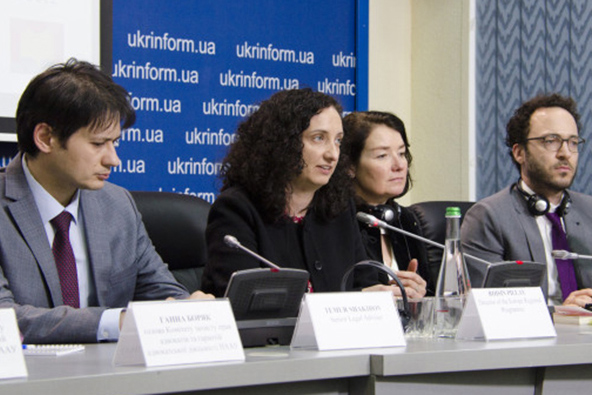
Mar 12, 2019 | News
Following its mission to Ukraine on 4-8 March, the ICJ has called on the Ukrainian authorities to take urgent steps to ensure the physical safety of lawyers and to bring to justice those responsible for a series of violent attacks against them.
During its visit, the ICJ delegation heard consistent testimony of attacks on lawyers by private persons, ranging from acts of intimidation to use of firearms against them.
Several lawyers have been attacked physically and verbally by individuals or organized groups, including in court. At least six lawyers have recently been killed in relation to the exercise of their professional duties.
These attacks take place in an environment where legislative reforms directed at governance of the legal profession, which would have grave consequences for freedom of association and the functioning of the bar association and civil society, have been proposed by the Presidential Administration without consultation with lawyers.
Without urgent and significant efforts to prevent attacks and combat impunity, the independence of the legal profession, and the ability of lawyers to protect human rights, will be increasingly jeopardized, the ICJ concluded at the end of its mission to the country.
It is of concern that violent attacks against lawyers, many of which have been credibly attributed to extreme right-wing groups, often result in impunity of the perpetrators, despite evidence and despite specific provisions in the criminal law which protect lawyers against attacks.
The ICJ heard that the law enforcement bodies often fail to investigate these cases in a prompt and impartial manner even where the identity of perpetrators is known.
The ICJ stresses that these attacks on lawyers, which are often related to the defence of clients in politically sensitive criminal cases, undermine the ability of lawyers to exercise their duties and protect the human rights of their clients, free from intimidation, hindrance, harassment or improper interference.
Furthermore, the ICJ recalls that under international human rights law, the State must take steps to protect the security of persons who the authorities know or ought to know are under threat, and they must ensure an independent, prompt, and thorough investigation of any attacks on the life or physical integrity of individuals.
In this regard, the ICJ stresses that a well-functioning, independent legal profession is essential to any justice system that upholds the rule of law. International standards recognize the importance of lawyers in protecting human rights and the contribution they make to maintaining the rule of law and the fair administration of justice.
The UN Basic Principles on the Role of Lawyers emphasize the importance of the independence of bar associations in ensuring the fair and effective administration of justice. Such associations must be institutionally independent, both in law and in practice, from all external actors, including the government, other executive agencies, parliaments and outside private interests.
In light of these standards, the ICJ is concerned about the process of adoption of draft law No 9055 “On the Bar Association and Lawyers’ Activity”, which was drafted without the necessary level of consultation and participation of a main stakeholder, the National Bar Association of Ukraine, which strongly opposes it.
It is unacceptable that in this context the draft law had been submitted to the Parliament through an urgent procedure, the need for which appears to be dubious, the ICJ says.
If adopted without the necessary consultation and endorsement by the Bar Association, this law may pose a threat to the independence of the legal profession in Ukraine and the capacity of civil society, including human rights defenders, to carry out their critical work, the Geneva-based organization adds.
The ICJ is particularly concerned that according to the draft law, lawyers would not be able to be employed by NGOs while being members of the Bar Association.
While international practice may differ, in the context of Ukraine specifically, this may undermine the ability of human rights NGOs to provide qualified legal representation or assistance to those whose human rights have been violated.
The ICJ further noted consistent allegations of corruption and lack of integrity of lawyers including in the context of legal aid system.
It also appears that the examination process for qualification as a lawyer, especially in some regions, is not free from corruption. Until now, the Bar Association has not been able to effectively resolve this problem which must be addressed as a matter of urgency.
The mission to Ukraine included members of the ICJ Secretariat as well as representatives of the Amsterdam and Geneva Bar Associations. It met with leading human rights NGOs, IGOs, the members of the Ukrainian National Bar Association as well as representatives of the Ministry of Justice of Ukraine.
The ICJ wishes to thank all those whom its representatives met in Kyiv. A final report based on the key findings of the mission will be published later this year.
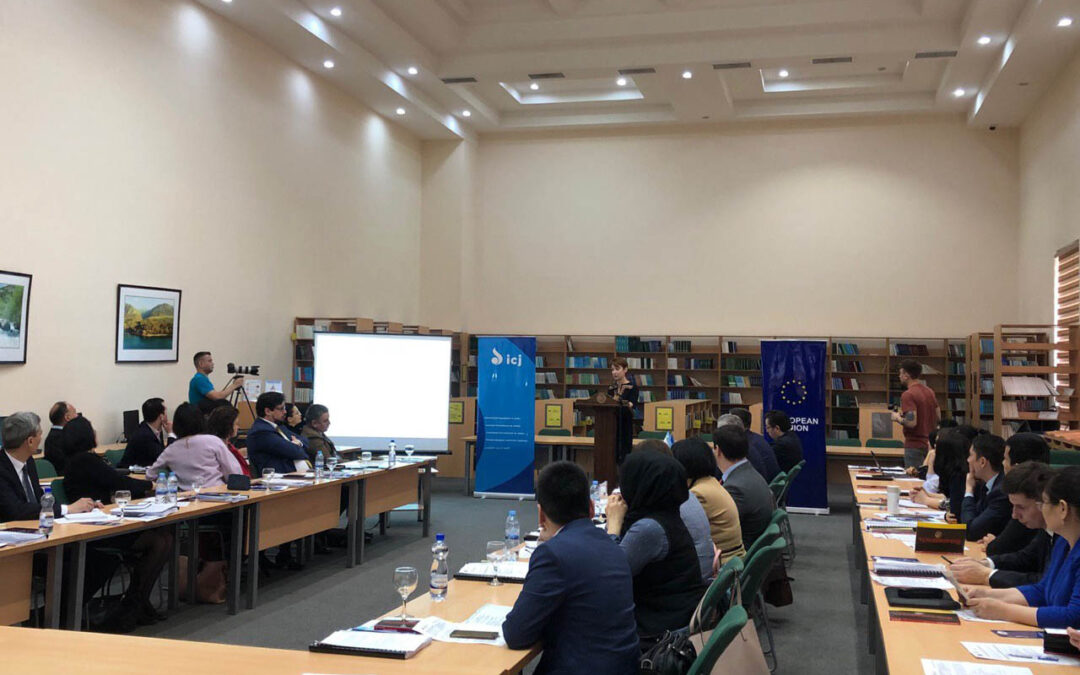
Mar 12, 2019 | Multimedia items, News, Video clips
Today, the ICJ and the Tashkent State University of Law (TSUL) in partnership with the UN Human Rights Office in Central Asia are organizing this event. The topic of the Third Expert Discussion is rights of persons with disabilities.
The Expert Discussions are part of “Access to Justice in Economic, Social and Cultural Rights Project (ACCESS)” supported by the European Union.
The Expert Discussions are aimed at increasing awareness about the implementation of international law and standards on ESC rights by national courts, to facilitate access to justice in relation to ESC rights and effective use of international human rights law for ESC rights at the national level.
Each Expert Discussion is supported by presentations of international and national experts.
The first experts’ meeting was held in September 2018 on international standards in labour rights, and the second meeting – held in December 2018 – on the principle of non-discrimination in courts and court decisions.
The two events brought together lawyers, defense lawyers, individual experts, academia representatives and law students via interactive discussions, research papers, peer review articles and policy papers. Selected papers will be published in collection of scientific articles by the end of 2019.
Mansurkhon Kamalov, the Deputy Rector of TSUL, said: “We have already held two expert discussions on the right to work and the principle of non-discrimination in courts together with the ICJ with the support of the European Union. Each event touched upon international and national standards and legal regulation of specific ESC rights. Our meeting today is organized on the eve of celebrating the day when independent Uzbekistan became a full member of the UN; and it raises a very relevant topic not only for the country, but also for the international community as a whole. The TSUL is pleased to cooperate with the ICJ, which helps increase public awareness about international legal norms and standards in the field of ESC rights and practice of their implementation at the national and international level; access to justice with regard to ESC rights, as well as the effective use of international human rights law to protect these rights at the national level.”
Ryszard Komenda, Head of the UN Human Rights Office in Central Asia, said: “Today, about 10 per cents of the population are persons with disabilities. Persons with disabilities are the largest minority in the world. This figure is constantly increasing as a result of demographic growth, progress in healthcare systems, and the overall population aging patterns, according to WHO’s world data. In the framework of the Universal periodic review (UPR) of Uzbekistan, that was held for the third time in May 2018, a number of the UN Human Rights Council members called on Uzbekistan to ratify the Convention on the Rights of Persons with Disabilities and welcomed measures that have been already in the process of implementation with the aim to ensure the rights of persons with disabilities in the country. According to the UPR outcome document, the Republic of Uzbekistan accepted relevant recommendations and declared its intention to ratify the Convention. Ratification of the Convention on the Rights of Persons with Disabilities will be a significant step in further promoting and ensuring implementation of international human rights standards in the Republic of Uzbekistan.”
Dmitriy Nurumov, ICJ Legal Consultant, said: “Access to justice, which includes a fair trial and equality before the law, is of particular importance for people living with a disability, who often face inter-sectional and multiple barriers to access justice. The ICJ believes that inclusive societies in which all individuals have equal access to justice, require identifying and overcoming systemic and practical barriers that hamper equal access to justice, including in enjoyment of ESC rights. The ICJ hopes that today’s discussion will map out such existing barriers and the ways they can be overcome.”
Contact:
Dilfuza Kurolova, ICJ Legal consultant, t: +998 90 9050099 ; e: dilfuza.kurolova(a)icj.org
Watch the video here:
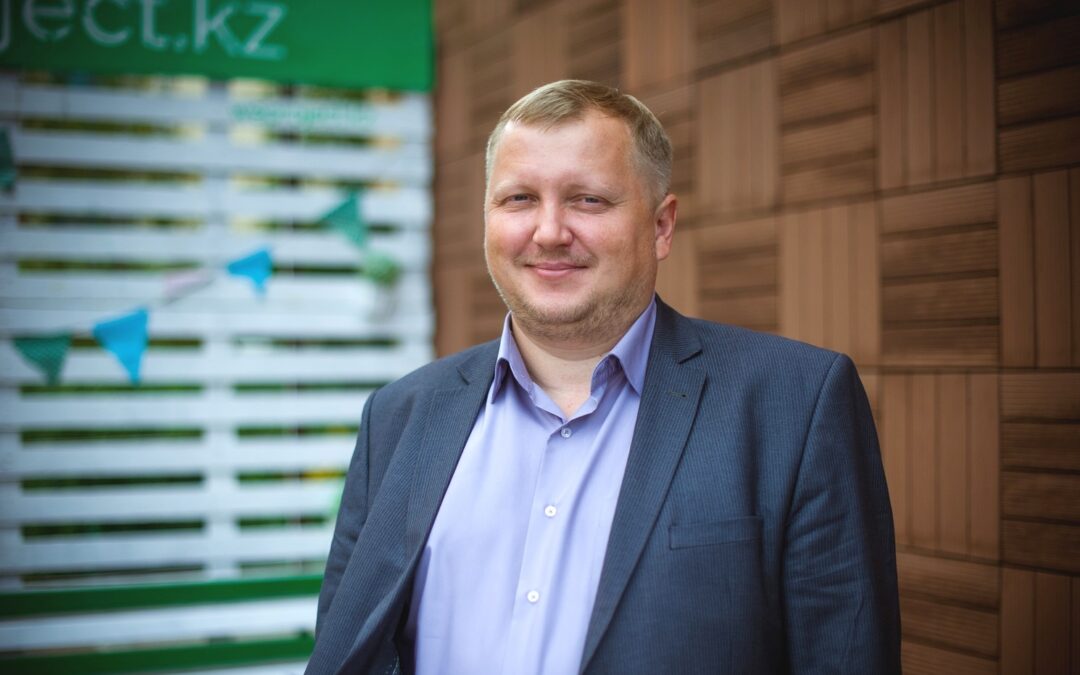
Mar 6, 2019 | News
Today, the ICJ expressed concern at the initiation of disbarment proceedings by the Ministry of Justice of Kazakhstan against Sergey Sizintsev, former Executive Director of the National Bar Association and the newly-elected head of the Scientific-Consultative Board of the National Bar Association.
The official ground for disbarment of Sizintsev is his work as the Director the National Bar Association in 2016-2018 while continuing his legal practice at the same time.
On his facebook public account, however, Sizintsev alleged that this initiative is not related to the officially stated grounds, and that in fact continuing to practice while working as Director of the Bar Association is clearly permitted by the Kazakhstan’s law. Rather, he alleges, he is being pursued for his criticism of the law “On lawyers’ activity and legal aid” as well as his public statements in different international and national fora in regard to issues related to the independence of the legal profession.
The ICJ recalls that freedom of expression and association, in particular, constitute essential requirements for the proper and independent functioning of the legal profession and must be guaranteed by law and in practice.
According to Principle 23 of the UN Basic Principles on the Role of Lawyers, lawyers “[…] have the right to take part in public discussion of matters concerning the law, the administration of justice and the promotion and protection of human rights and to join or form local, national or international organizations and attend their meetings, without suffering professional restrictions by reason of their lawful action or their membership in a lawful organization. In exercising these rights, lawyers shall always conduct themselves in accordance with the law and the recognized standards and ethics of the legal profession.”
Sergey Sizintsev as Executive Director of the National Bar Association and as a member of the Parliament working group on the Law on Lawyers’ Activities, was expected to voice concerns of members of the legal position including on the new law which the legal profession consider to be restrictive.
Moreover, his position demanded that he expresses his position on behalf of the National Bar Association including to draw attention to legislative developments which can jeopardise the independence of the legal profession in Kazakhstan.
The ICJ is concerned that this initiative appears to constitute an attack on the independence of lawyers in Kazakhstan and may have a chilling effect on members of the legal profession.
The ICJ therefore calls on the Ministry of Justice to end this lawsuit immediately.
The ICJ will closely follow the case of Sergei Sizintsev and the proceedings at the Rayon Court in Petropavlovsk.
In December 2017, the ICJ organized a mission to Kazakhstan and raised concerns over the then planned reform.
In November 2018, the ICJ raised concern at the disbarment proceedings against Presidents of Aktybinsk and Pavlodar Bar Association as well as resignation of Anuar Tugel, the President of the National Bar Association of Kazakhstan, allegedly as a result of the pressure from the Ministry of Justice.










